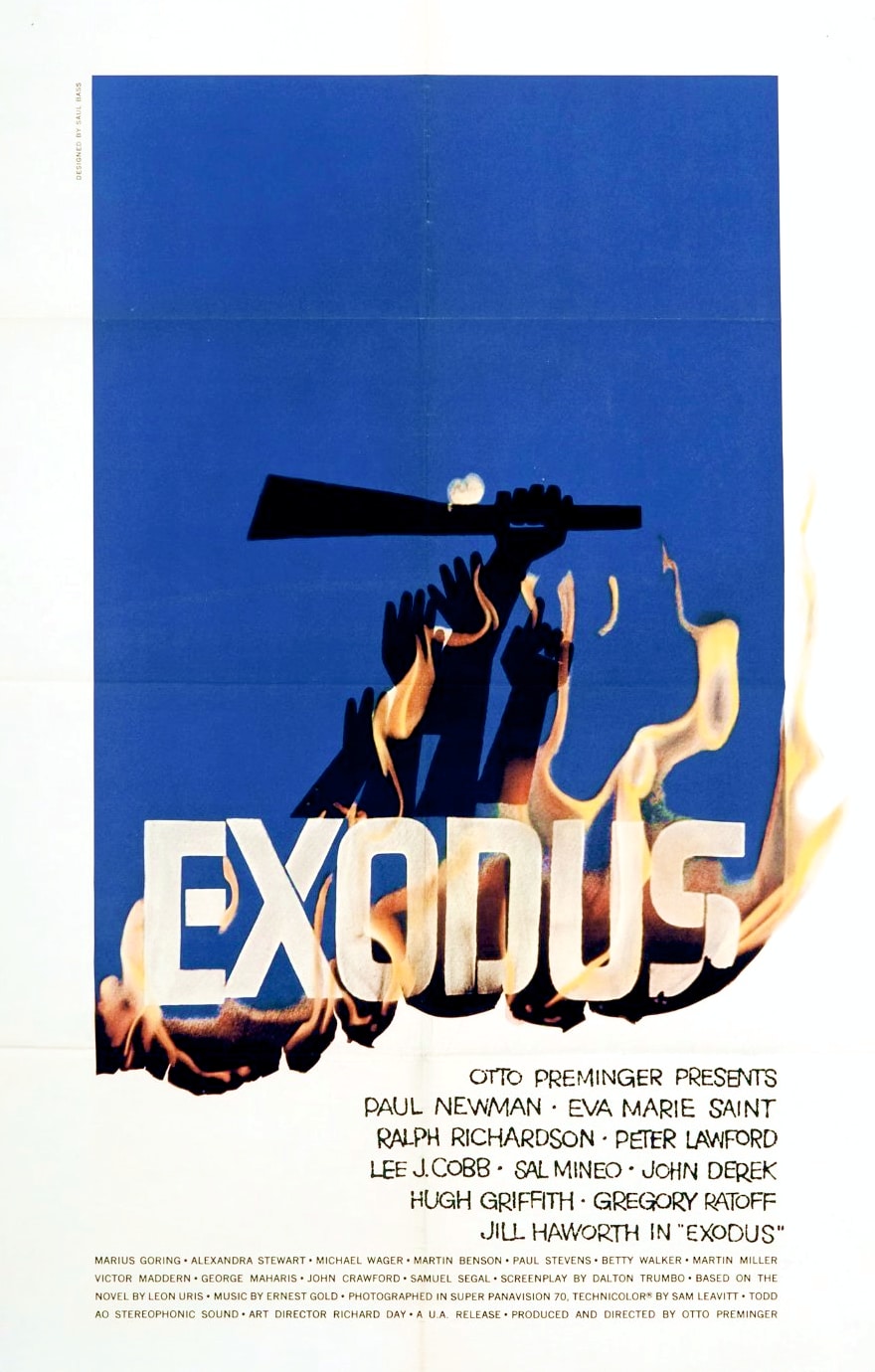With its Ernest Gold score enhancing its cinematic majesty, the 1960 film Exodus tells you point blank that it’s an epic motion picture, a religious story of great myth and significance and a cast who depict historical figures in a dramatic way that transcends flesh and blood to the silver screen. Ben Hur, with its Charlton Heston-led magnificence, is not a historically accurate film; however, powerful emotion enshrined with belief and faith still makes it a great one. Exodus reaches for this same level, and sanctions the State of Israel in a manner that helped to establish the modern truth of a people who deserve to return to a land which (we are told) always belonged to them.
Absent from the screen are the 250 people, including women and children, savagely murdered by militant Israelis in April 1948. Their bodies and their village were wiped from history, today turned into a suburb called Givant Shaul. Only one of many such atrocities, this was, after all How The West Was Won. Once the Palestinians fled, taking with them the keys and deeds to their homes with hope of returning, the new Israeli authority arbitrarily renamed towns and locations with modern Hebrew sounding words. This is the history that goes unrecorded in cinema or dismissed in magazines about war which tell of glorious airmen smuggling B-17s from Europe to serve the nubile Israeli Air Force, while vintage Hotchkiss tanks and Czech arms helped the new state grow.
I grew up reading War Monthy, War in Peace and other magazines that often featured photos and break downs of astonishing Israeli Defense Force (IDF) victories. I even converted a few model M4 Sherman tanks from looking like James Garner’s into a super variant that helped win the Six Day War. At thirteen, I did a school report on Moshe Dayan, the virtuous Rommel of Israel, with rugged, handsome features like a bald Snake Plissken. It was exciting to see vintage half-tracks alongside Centurion and Patton tanks, Mirage and Phantom fighter jets dominating the skies. The Palestinian Libertarian Organization (PLO) and Popular Front for the Liberation of Palestine (PFLP) were scary looking killers, in an era when Carlos the Jackal was both a legend and real, and the murderous terror of the Munich Olympics was an ever constant reminder: they simply hated Jews. Colonel Qaddafi, Ayatollah Khomeini or Saddam Hussein, were each an angry looking dictator who hated Israel and ruled with viciousness.
But the events of Lebanon showed a gritty war, with no romantic desert for battles to take place and instead an urban backdrop of civil war. Then I read Robert Fisk. I began to see past the glory of battle and the depiction of unbeatable Israeli armor, or heroes like the ones who saved the hostages from the ruthless Idi Amin. Today I believe there are no goodies or baddies, just killers. However righteous they may feel or believe themselves to be, it does not make them virtuous; courageous perhaps, but not morally heroic.
Media and cinema made it hard to empathize with those fighting the IDF or even Uncle Sam. The ignored do not win Oscars. They suffer and die, they’re not granted grandiose speeches or moments of glory to stand above others as historical monuments of destiny.Even anti-Vietnam war movies had a tendency of showing the North Vietnamese Army and Viet Cong as narrative props rather than actual human characters. It’s easier to empathize with the invaders that way, a nation in an alien land fighting an alien people. The real victim of war, we are told, are the soldiers of the empire, not the civilians, whose deaths are just the inevitable reality of war. In 1982’s Codename: The Soldier, Ken Wahl is an elite agent whose team must avert global destruction. They can trust no one; seemingly innocent civilians are actually armed enemy agents that must be killed, old women included. The stakes are that high.
Charges of antisemitism run rampant, and some are credible. The conflation of all Judaism with Zionism or even Israeli state policy works in ways that confuses truth. Some critics of Israel can only see a world through their own bigoted lens; all Jews are responsible in some fantastic way. The very notion of a religion being a race or even a nation was once in itself antisemetic. The separation of individuals who practice a faith from those who use faith as an imperial writ to conquer and kill is a nuanced dance that propaganda hinders. It becomes a self-fulfilling prophecy for the most ardent of Zionists and antisemites that Jews must have been rightfully persecuted and continue to suffer, so therefore a powerful Jewish state is required and must be relentless in its ambitions. This is both a slur and a justification for that which is being slurred.
For those who recall the false claim that Iraqi soldiers were throwing babies from their incubators as a justification to fight such a menacing regime, we now have actual evidence of babies forced to leave hospitals; those that remain are cut from life, left to rot in incubators. IDF soldiers are dancing in schools and hospitals where children’s blood paints the walls and their tears stain the floor. We see this with no director to guide the narrative. Instead, the United States eagerly supplies these killers with ammunition for murder. Then again, it supplied that same Iraq once too, despite the evils of that government. History likes to rhyme.
The film Exodus is also known as To Cast a Giant Shadow; the shadow of war and its exceptional evil has been cast across the world. Indifference reigns among many as they witness real life genocide and the intentional targeting of civilians that’s seldom encountered among audiences when watching cinema. In the real world, where there’s victims and consequences, the dramatic structure of film and story seems to matter more. The villains are those who would harm the innocent. No matter what God they pray to, or national flag they worship, should they hurt the innocent, they are evil. And that should not just be in the movies.
































